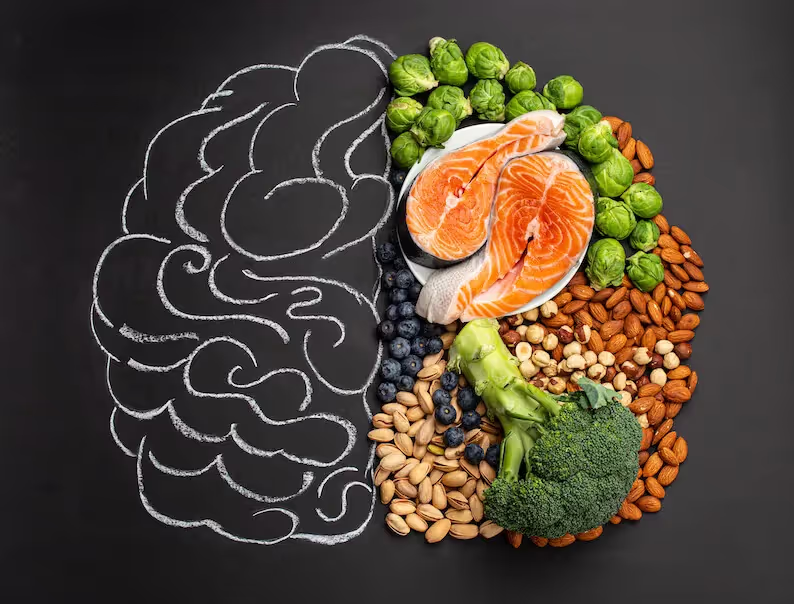We've heard it a million times (and have probably said it a few, too), but there's some truth behind the proverbial saying, "You are what you eat."
"We act like a garbage can, just putting stuff in and expecting [our body] to work perfectly, while we are sabotaging it right away," said Dr. Jolanta Tombarkiewicz from VIPcare Ormond Beach.
If you eat a bunch of junk, including sugar, processed foods, and red meat, your body isn't going to be in the best shape. And you certainly aren't going to be feeling or thinking your best. But if you eat a healthy, well-balanced diet and are careful about what you put into your body, your health will show it from head to toe.
"Let the food be your medicine first," said Dr. Tombarkiewicz.
We mainly think about diet and how it will affect our physical appearance. However, our diet is important for keeping our brain functioning at a high level. Studies show that foods rich in vitamins, minerals, antioxidants, flavanols, polyphenols, and omega-3 fatty acids help protect our brains by improving memory, concentration, and overall brain health. And just as there are a million diets to keep our bodies in tip-top shape, there are diets that focus specifically on brain health.
A Diet for Your MIND
The Mediterranean and DASH diets have been deemed two of the healthiest diets. Research shows that they lower blood pressure and reduce the risk of heart disease and diabetes. We know all of these chronic conditions can significantly impact your brain, even increasing your risk of developing Alzheimer's or dementia. So, to combat the diseases and to keep your brain healthy, researchers mashed the two popular diets together to create the MIND diet. These two diets consist of foods for brain health.
MIND stands for Mediterranean-DASH Intervention for Neurodegenerative Delay. It's a diet solely focusing on foods for brain health and helping to reduce your risk of Alzheimer's disease and dementia. It pulls key elements and foods from both the Mediterranean diet and DASH diet that target the brain.
Foods to Eat on the MIND Diet
The MIND diet encourages the following foods for brain health:
Leafy, green vegetables – Spinach, kale, collard greens, and other leafy greens are packed with nutrients, including folate, vitamin K, beta carotene, and vitamin E. Vitamin E protects cells from experiencing free radical damage, which is a major contributing factor to cognitive decline.
Whole grains – Swap out white rice and pasta for brown and wild rice, farro, quinoa, and whole wheat bread and pasta. These whole grains are rich in vitamin B, which helps to keep brain cells healthy by boosting the production of neurotransmitters– the chemicals in the brain that deliver messages.
Nuts – Eating nuts regularly is great for brain health thanks to their fatty acids, vitamins, minerals, and antioxidants. In addition, they contain an excellent source of alpha-linolenic acid (ALA), a plant-based omega-3 essential fatty acid. ALA has been shown to reduce inflammation and oxidative stress, thus helping to counteract cognitive decline.
Berries – Blueberries, raspberries, blackberries, and strawberries are full of antioxidants vital for brain health. Berries are one of the top foods you can eat to nurture your brain.
Beans – In addition to being a great source of fiber, beans are great sources of protein and B vitamins. Fiber helps to slow down digestion, which helps to keep blood sugar levels stable.
Seafood and poultry – Opting for lean animal protein sources is beneficial not only for your heart health but also for your brain health. In addition, some forms are rich in omega-3s, such as salmon and tuna.
Foods to Avoid on the MIND Diet
The MIND diet suggests limiting or avoiding the following foods:
Cheese – Try to limit full-dairy foods that are high in saturated fat. When eating dairy, select low-fat options.
Red meat – Beef, pork, and lamb tend to be high in saturated fat,contributing to arterial plaque that can limit blood supply throughout the body. In addition, some forms of red meat are also high in nitrates, leading to increased fat in the liver, which can be toxic to the brain.
Fried food – People who eat a lot of fried foods experience increased inflammation, which damages blood vessels responsible for bringing blood to the brain.
Pastries and sweets – Most prepackaged snack foods fall into this category. Most of these foods are processed and full of sugar.
Butter and margarine – Often high in saturated fat, try limiting butter and margarine to less than one tablespoon a day and using olive oil as your primary cooking fat.
About Jolanta Tombarkiewicz, M.D.
Dr. Jola Tombarkiewicz is an Internal Medicine primary care physician with over 38 years of experience in the medical field. She received her medical degree from Silesian University in Poland and completed her Internal Medicine residency at Jackson Memorial Hospital, the primary teaching hospital of the University of Miami's School of Medicine. As a provider, she enjoys educating and inspiring patients by example and through alternative information. Dr. Tombarkiewicz has experience in oriental medicine, acupuncture, yoga, Reiki, and Pranic Healing.




